by Georgia Center for Opportunity | Jan 29, 2015
Imagine being told that your daughter won’t graduate from high school. Now imagine that your daughter is only 5 years old when you receive the news. This happened to someone I know.

Katherine is the mother of now 17-year-old Grace. Twelve years ago, at about the time that Grace was to enter kindergarten, Katherine and her husband noticed signs that Grace might be facing learning challenges. They took Grace to be assessed by local public school personnel and determined their concerns were well founded. Grace did indeed have a learning disability.
The staff at the school was great. They were sensitive, methodical and thorough. They assured Katherine that the school had a program that was well suited to meet Grace’s needs. They mapped out the program all the way through the 12th grade.
But as the meeting was winding down, everything changed. For the worse.
“You need to understand,” said the teacher as she wrapped up the assessment, “when Grace finishes the 12th grade she won’t have a diploma, she will have a certificate of completion.”
Katherine was dumbfounded.
“You mean she won’t graduate?” she asked.
“That’s right,” the teacher said. “She’ll have a certificate that indicates that she completed high school, but not that she graduated.”
It surprised and dismayed Katherine and her husband that the school was determining the long-term future of their five-year-old daughter. It was particularly troubling to them because they knew what studies say about the prospects for kids who do not graduate from high school – that they’re less likely to find steady employment or form a healthy marriage and family life.
Where is Grace today?
Although she didn’t start reading until she was ten years old, she is now on schedule to graduate in May of 2017 – with a diploma.
How did she make such progress? Well, when Katherine and her husband heard the school’s prognosis, they set out to find other ways to educate Grace. They determined they needed maximum flexibility. Fortunately, Katherine’s husband made enough money to give her the flexibility to stay at home and enroll Grace in the various academic and therapeutic programs that have driven her success.
It’s been a challenging and uneven journey at times, but Grace’s parents have found a way to make it work. But they’ve often wondered, “What about those people who are told the very same thing we were but don’t have the resources or ability to make adjustments and exercise choices?”
How many of these students will be finishing high school this coming May with a “certificate of completion”? And how would their lives be different if they had more options available?


There are thousands of other parents who are struggling due to a lack of choices for their child’s education. You may be one. You may know one.
This is why at the Georgia Center for Opportunity (GCO) we’re focused on passing broad school choice reform. We know that if a child can get an education that fits his needs, it can drastically change the trajectory of his life.
I’ve been with the GCO for 18 years, and we’ve consistently advocated for policies that ensure children can receive the best education possible. During this time, GCO’s work and the generous donors who support it have contributed to the passage of Georgia’s Special Needs Scholarship and Tuition Tax Credit programs.
These programs have helped some 17,000 students get the education that best fits their needs. But there are more than 1.6 million students in Georgia’s public school system. This means there are still many children who are locked in to a school that’s not meeting their needs, simply because they can’t afford a private education or to move to a district with better public schools.
This is why more must be done.
In the current legislative session, GCO is advocating for an Educations Saving Account plan which would provide the most flexibility and maximize a family’s ability to pay for a private education and other educational needs, like tutoring, while having the ability to save for college. There’s also an opportunity to expand the Tuition Tax Credit program, by either creating a new corporate program or expanding the existing one.
If we’re going to pass broad school choice reform, now is the time.
That’s why our team at GCO is working harder than ever to mobilize grassroots advocates, engage business leaders, and meet with legislators and the governor to bring them together on the issue. But we need your continued support to make the dream of school choice for every child in the state a reality.
I hope you’ll consider joining us in this important work by making a tax-deductible gift today. If you would like to learn more about the work GCO is doing in education, I also encourage you to read through our school choice initiative page.
by Georgia Center for Opportunity | Jan 29, 2015
Successful reentry for those coming home from prison is a concept that is not easily defined.
Most often, success is defined in terms of low recidivism – that is, fewer people who return to prison within three years of their release. However, simply measuring successful reentry in terms of recidivism does not present a complete picture of what it means to successfully reintegrate. There is much more to it than a person simply not ending up back in prison. To gain a more complete picture of what it means to successfully reintegrate into society – into a community, a family, and a faith – it is helpful to a look at a real-life example of someone who has done it.
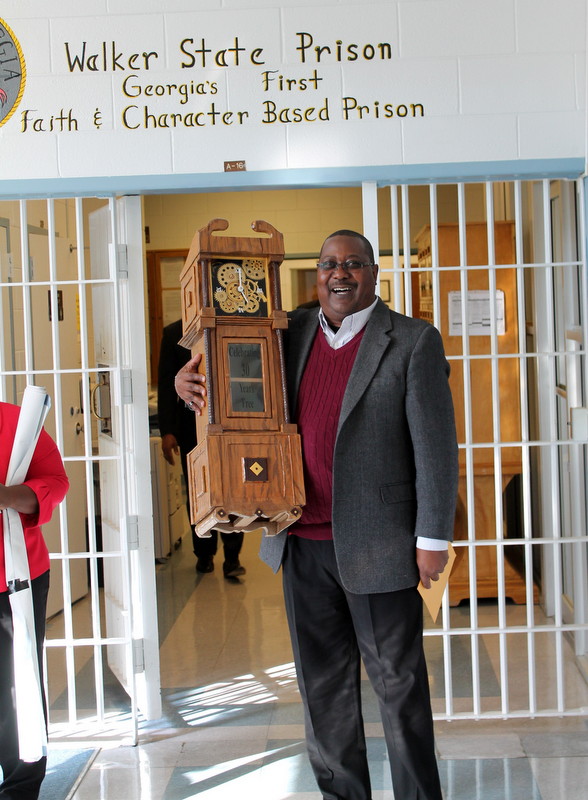
Meet Tony Kitchens – a husband, father, son, and brother – who spent 12 years behind bars in Georgia during the 1970s and 1980s. Today, Tony is an Evangelism Catalyst with the North American Mission Board (NAMB) and has consulted with the Governor’s Office of Transition, Support, and Reentry (GOTSR).
He is celebrating thirty years of successful reintegration this January 2015 – a journey which he says is still continuing to this day.
In honor of Tony’s thirty years of successful reintegration, Walker Faith and Character Based Prison in Northwest Georgia held a Reentry Celebration for him on January 9, 2015. The celebration provided the opportunity for family, friends, coworkers, non-profit leaders, Department of Corrections (DOC) staff, the residents of Walker and the Governor’s Office to recognize Tony for his successful journey of navigating reentry to reintegration; it also provided Tony a wonderful opportunity to give current inmates a picture of what is possible for their lives.
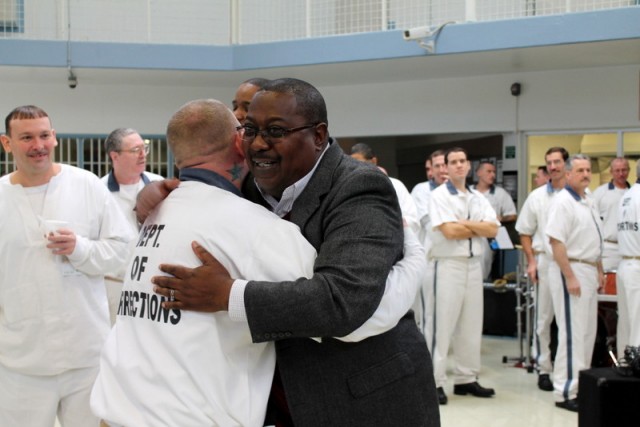
Tony – who was once an inmate at Walker State Prison – brings a unique perspective that carries a lot of weight among the men at Walker. He has the ability to address them as one who was once in their shoes; one who mopped the same floors they now mop and slept in the same cells they sleep in.
The Reentry Celebration took place in the prison cafeteria – a large space filled with hundreds of inmates dressed in white uniforms and nearly fifty guests. Above the stage hung large banners with seals from various state agencies, along with canvases painted by the inmates that included the seal of Walker Faith and Character Based Prison, the North American Mission Board LoveLoud logo, and a creative rendering of a line Tony is often heard quoting:
“I keep the penitentiary in my rear view and what lies ahead in my pre-view.”

A quartet comprised of inmates from Walker opened the celebration by singing the national anthem. The performance astounded everyone, including Jay Neal, Executive Director of the Governor’s Office of Transition, Support, and Reentry (GOTSR), who commented that Super Bowls do not have performers who sing as well as they did. This performance was followed by an introduction of the speakers and a powerful recitation of the “Brothers Creed” in which hundreds of inmates pledged to live exemplary lives of character while in prison and once they are released into the community.
Jay Neal followed as the first of a several speakers who would present at the event. Neal spoke about the first step required for successful reintegration, which is having accountability in one’s life. He reflected on his own experience as a young man and learning the need to have accountability in place before entering the pastorate. He encouraged the inmates in attendance to take this same measure in their own lives, as it is an important aspect of living a life of good character.
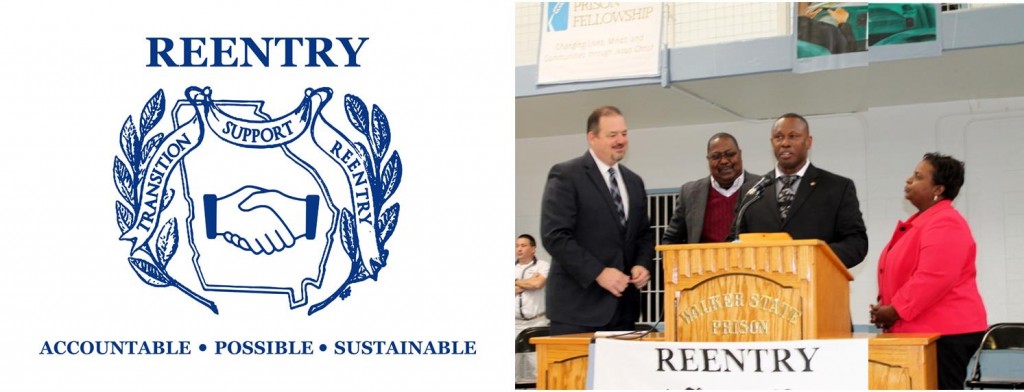
The next speaker, Tony Lowden, a pastor and Project Coordinator for the Prison In-Reach Grant for the Georgia Prisoner Reentry Initiative (GA-PRI), built upon the principle of accountability and spoke about possibility. He recalled the biblical figure David and his calling to be a king, explaining that David had to first experience time hiding from his enemies in the Adullam Cave before he ascended to the throne. He paralleled this experience to inmates’ time in prison, calling it their “Adullam Cave,” and encouraged them to dream of being who they are meant to be – leaders of their families and communities.
Following Mr. Lowden, one of the inmates from the quartet sung R. Kelly’s “I Believe I Can Fly,” while another played the piano. The performance inspired the entire room and several shouts of approval could be heard from among the hundreds of inmates sitting in attendance.

Brenda McGowan, Southeast Regional Director for Prison Fellowship, came on deck third and highlighted the importance of sustainability for successful reintegration. Touching on the life of Chuck Colson and Tony Kitchens, a Colson scholar, she discussed how a transformed life is the only way a person can face the difficulties of reintegration without losing hope.
Last of all, Tony Kitchens delivered the keynote address which tied the entire message together. He drove home the point that reentry is a destination whereas reintegration is a journey. He compared reintegration to the game of baseball and explained that it is not ultimately about hitting a home run; rather, it is a day-by-day process that is slow and much more like advancing from one base to the next. First base is becoming accountable, second base is seeing and believing what is possible, and third base is sustaining that vision through a spiritual transformation of the mind and heart.
“Reentry is a destination whereas reintegration is a journey.”
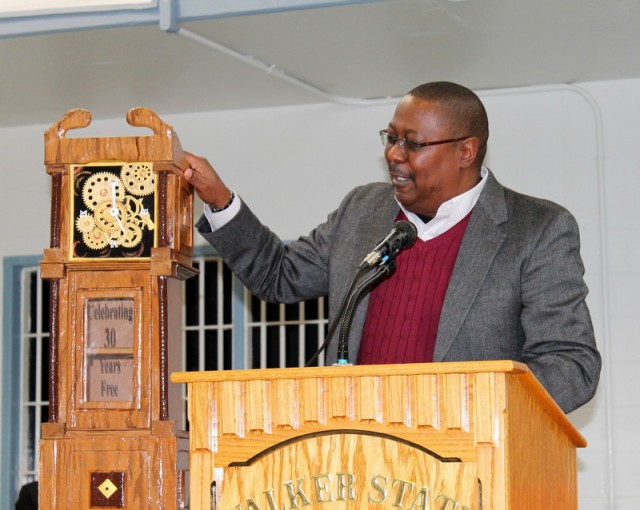
Upon finishing, Tony received a standing ovation. He was presented with a personal letter from Governor Nathan Deal commending him for his excellent example for returning citizens and Georgians at large. Tony was also presented with a beautifully crafted grandfather clock that a group of inmates made out of recycled material from Walker prison – an excellent representation of Tony’s life in the way he has “redeemed the time” and used his gifts well in the community. The clock reads, “Celebrating 30 Years Free” on the front glass pane.
It was clear that the inmates at Walker were glad to see someone who is overcoming the collateral consequences of incarceration. Tony’s life serves as a powerful testimony to the redemption that is possible for returning citizens, and his message gives them hope that they can experience the same.
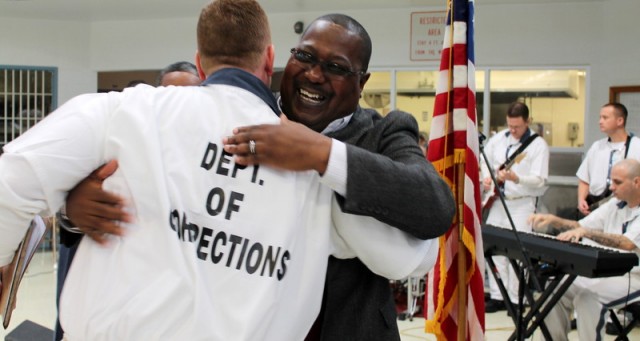
by Georgia Center for Opportunity | Jan 8, 2015

With Congress returning to work this week and the Georgia General Assembly doing so on Monday, many voters are watching to see what issues are tackled (or not) in the coming months.
A new poll released this week suggests Georgia lawmakers ought to carefully consider advancing school choice.
Georgia voters rank K-12 education as the most likely issue to motivate them to vote in 2016: more than jobs, more than taxes, more than pre-K, more than any other single issue.
It makes sense. People believe students deserve an excellent, effective, education. If a child graduates from high school, he/she is much more likely to have success in life, family, career and society. If a child doesn’t graduate, or graduates without the knowledge and skills necessary to pursue college or a career, that child is much more likely to struggle. It doesn’t mean they are doomed. It just means they’ve got a tougher road ahead, one more likely to lead to detours involving public assistance, incarceration, family instability and so on.
The instinct of voters (and humans, generally) is that every child deserves a shot at a great education that prepares them for success in life. The problem, if we are willing to be honest, is that far too many of Georgia’s students are in schools that aren’t meeting their needs. Maybe it’s a chronically poor-performing school. Maybe it’s a generally good school that just isn’t the right fit for that child.
Perhaps this is why more than two in three Georgia voters favor school choice (66%/29%). What’s more interesting is that support for school choice generally, and certain programs specifically, transcends traditional partisan political and demographic boundaries.
For instance, sixty-three percent (63%) favor the creation of the Georgia Opportunity Scholarship Program, which would “allow parents to use the money the state has set aside for their child’s education to send them to the public, private or church-run school of their choice”—even when told this is sometimes referred to as a “voucher,” traditionally a highly polarizing term (support is higher without including the “v-word” disclaimer).
Dig a little deeper in the poll’s crosstabs and the story gets more interesting. Seventy-one (71%) of GOP primary voters favor creating this type of scholarship program. That may not be a surprise. But it turns out almost two-in-three Black voters – regardless of partisan affiliation – support the program, even more than White voters (64%/61%). Support among female voters – again, regardless of partisan affiliation – is stronger than that of men (67%/59%).
Eight-five percent (85%) of Georgia voters support Georgia’s current Special Needs Scholarship, currently the state’s only K-12 voucher program, including a whopping 92% of Black voters and 81% of GOP primary voters.
If I were an elected official (mercifully, for everyone, I have no desire to ever hold public office), an issue that garners 60% or more support from every key demographic: men/women, White/Black, younger/older, would be a dream. Passing a law giving more students access to an effective education also happens to be a political winner.
Mom and apple pie, meet school choice.
As the pollster concludes in his official memo: “BOTTOM LINE: Georgians are showing a strong propensity to favor increasing school choice programs. Even in a highly polarized political environment, these policies garner support across many key voter groups. As the new legislative session approaches, lawmakers should be mindful of voters’ desires to increase educational options for students and parents and make scholarship programs more inclusive.”










